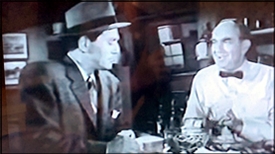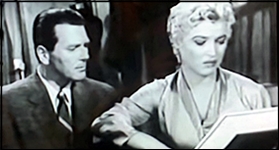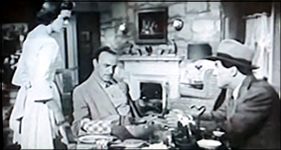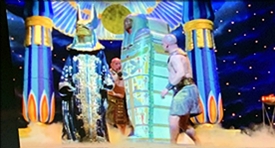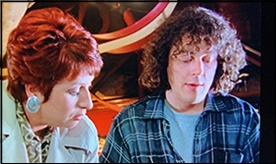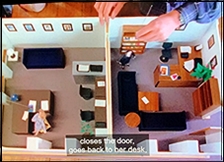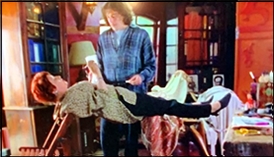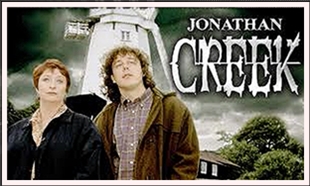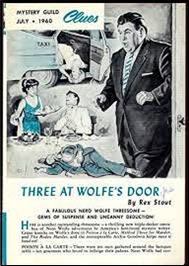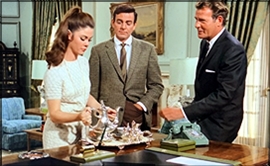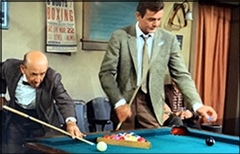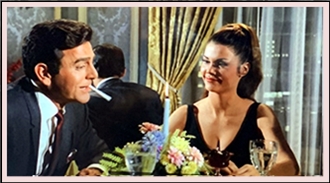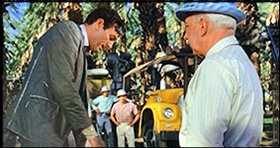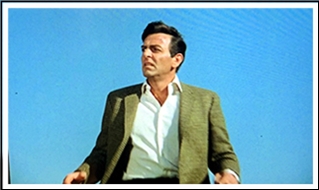Mon 24 Jun 2024
Nero Wolfe on Page and (Small U.S.) Screen: Too Many Clients, by Matthew R. Bradley
Posted by Steve under Reviews , TV mysteries1 Comment
Too Many Clients
by Matthew R. Bradley

Completing the titular motif of Rex Stout’s Too Many Cooks (1938), Too Many Women (1947), and “Too Many Detectives” (1956), Too Many Clients (1960) opens as Thomas G. Yeager, the executive VP of Continental Plastic Products, arrives unannounced at the brownstone. Hired to confirm that he will be followed from his house on East 68th Street to 156 W. 82nd Street that evening, and ascertain by whom, Archie enlists the services of trusted cabbies Albert Goller and Mike Collins. The client is a no-show, and after Purley answers Archie’s phone call with a tell-tale “Mrs. [emphasis mine] Yeager’s residence,” Lon Cohen at the Gazette reveals that his body was found in an excavation on West 82nd.
Lord knows, I’ve made little attempt to enumerate pop-culture references in books dating back 90 years, but Lon is jokingly told he will receive a Christmas card from “Archie and Mehitabel and the children,” alluding to the respective cockroach (Archy) and cat created by Don Marquis in his New York Evening Sun column in 1916, whose exploits — beloved of my father, IIRC — were often illustrated by George (Krazy Kat) Herriman. The photos in Lon’s file prove that the “client” was not Yeager…who was already dead, so with their bank balance perilously low, Archie seeks one. From superintendent Cesar Perez and his daughter, Maria, he learns that Yeager, referred to as “Mr. House,” owned 156 W. 82nd.
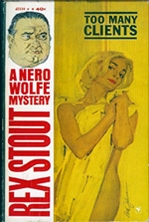
After Archie intuits that Cesar found Yeager’s body in his well-used love nest, per Wolfe a “preposterous bower of carnality” — belying the ratty address — and hid it in the Con Ed site, Mrs. Felita Perez offers a $100 fee. They are interrupted by stage star Meg Duncan, whom Archie had recently seen in The Back Door to Heaven, and came for her cigarette case, offering $1,000 to find and keep it for her, “but too many clients can be worse than too few.”
With Saul Panzer unavailable, he summons Fred Durkin to hold down the fort and restrain any visitors, presumably female, at gunpoint if needed while he returns to the brownstone, where he has arranged for Mr. and Mrs. Perez and (separately) Meg to come.
Meg concedes “awareness that she had — uh — colleagues. Or rivals,” but either can’t or won’t provide any information regarding them or pay Wolfe $50,000 to suppress possible evidence in a murder. Questioned in Spanish, “one of his six languages,” the Perezes say Yeager paid them $50 a week, letting them live for free in the basement and keep the rent for the rooms on the first four floors; convinced that Felita killed him for “debauch[ing]” Maria, Wolfe refuses their fee, upped to $250. Fred summons Archie, having “caught a fish” who scratched his face: Julia McGee, Yeager’s secretary, sent to seek anything to connect him to the house by Continental prexy Benedict Aiken, joining her chez Wolfe.
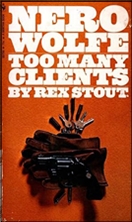
Aiken corroborates Julia and hires Wolfe for an unspecified fee to investigate, if possible protecting the corporation; then, Ellen Yeager arrives and hires him to find her husband’s killer, with a proviso that he will terminate his arrangement with Continental in the event of a conflict. They are interrupted by Cramer, aware that Archie asked Lon about Yeager two hours before he was found but seemingly not of the notorious room, when Fred calls to report another fish, so Archie departs on a pretext. On arrival, Felita shows him a deed sent them by attorney John Morton Seymour, conveying the house to them in the event of Yeager’s death, “so nobody could know he owned [it] and we must not say he owned it.”
Upstairs, he finds Dinah Hough, who has admired his dancing at the Flamingo and left an umbrella while allegedly avoiding Yeager’s advances; learning that hubby Austin teaches English lit at NYU, Archie pegs him as “Yeager,” who’d quoted Elizabethans and Robert Browning. Brought to Wolfe, he explains his idea that the revelation to Yeager — thought to be alive — of an unidentified impostor would let her know that he knew of their affair. That night, Felita awakens Archie to report that Maria was shot after seeing a movie with friends, and hidden in her drawer, he locates a cache of information on Yeager, including multiple sketches of some eleven women, one dated the night he was killed, resembling Julia.
Archie requests Felita’s $1 fee to investigate her murder and calls off Fred, summoned by Wolfe along with Julia, who arrives with Aiken and is tricked into admitting she had been there, purportedly to take dictation, finding Yeager dead. Excluded as Wolfe instructs the ’teers, Archie visits Meg, who admits paying Maria $5 in monthly “hush money”; Austin, who has clearly beaten Dinah to a pulp; and Ellen, who insists on seeing the room despite the risk of surveillance.
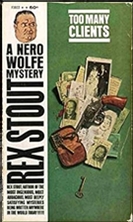
They meet Purley on the way out, forcing Archie to lie like mad, backed up by the quick-on-the-uptake Ellen and Felita, but Stebbins is no fool, and all the supposed coincidences get Archie a trip downtown, compartmentalizing two sets of facts.
Wolfe asks Aiken to bring Julia, and Saul to bring a certain Arthur Wenger, who through the trick picture of the waterfall looking into the office i.d.’s Aiken as the man for whom he duplicated Julia’s highly unusual Rabson keys. Knowing that Yeager would be alone while awaiting her arrival, Aiken eliminated the growing threat to his leadership; he then writes and signs a confession — drafted by and mailed to Wolfe — that conceals the room’s existence before killing himself. Cramer knows damn well from the wording that Wolfe wrote it, but with Aiken dead he is not obliged to reveal his evidence, and the Continental directors agree to pay a $50,000 fee, while Archie returns the cigarette case and umbrella.
A two-part second-season episode of A Nero Wolfe Mystery, “Too Many Clients” (June 2 & June 9, 2002) was one of director John L’Ecuyer’s four collaborations with screenwriter Sharon Elizabeth Doyle. It boasted an unusually large number of typos in the opening or closing credits, misidentifying the regulars and repertory players cast as Orrie (Trent MacMullen [sic]), Cesar (Alec [sic] Poch-Goldin), Director #2 (David Schurman [sic]) and Woman in Bathroom (Shanon [sic] Jobe) and Kitchen (Hayley Vernon [sic]), respectively. Michael Sarrazin appears in flashbacks, uncredited, as Yeager; sometimes seen as the dreaded Lt. Rowcliff, Bill MacDonald plays Austin, the faux Yeager hiring Archie (Timothy Hutton).
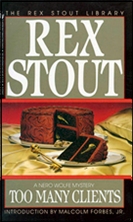
Covered with a tarp by Cesar out of simple decency, Yeager is found by boys retrieving a ball — which conveniently lands in his open palm — as Archie ponders his absence with Al (Marty Moreau), and after hanging up on Purley (R.D. Reid) he seeks further information from Lon (Saul Rubinek). Well-cast Jeanette Sousa makes her only appearance as Maria, described in the book as “one of the three most beautiful females I have ever seen”; while addressed by name, Felita (Lucy Filippone) says they “were paid not to know” Meg (Kari Matchett). Fred’s (Fulvio Cecere) tedium is well depicted, as is his tussle with Julie (sic; Christine Brubaker), wrapped up in a coverlet, who later calls for Aiken (James Tolkan).
In his pique over being stymied, Wolfe (Maury Chaykin) even wrangles with Fritz (Colin Fox); as he is being hired by Ellen (Debra Monk), Dinah (Dina Barrington) awakens Fred in the bathtub, and Cramer (Bill Smitrovich) drops in. Called “Mike” in the novel, Meg’s “square-jawed female” employee is now Matilda (Lorca Moore). Found by Saul (Conrad Dunn), Wenger (Robert Bockstael) fingers Aiken, and after his suicide, Doyle eliminates the parting shot with Cramer, jumping ahead to the meeting with the directors — including Richard Waugh and Steve Cumyn — and a new denouement, in which Archie watches the Perezes, whose daughter’s murder must remain officially unsolved, mournfully dancing…
Up next: “Eeny Meeny Murder Mo”
Edition cited:
Too Many Clients: Bantam (1971)
Online source:
